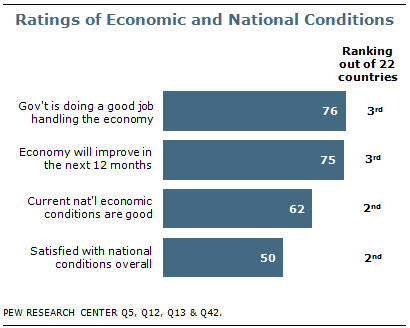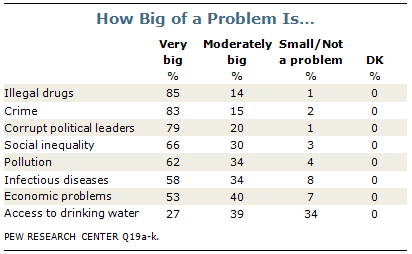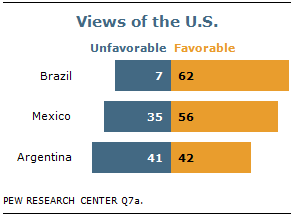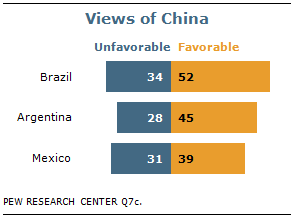Overview
 As the eight years of Luiz Inácio Lula da Silva’s presidency draw to a close, Brazilians offer largely positive assessments of where their country stands. At a time when global publics are mostly glum about the way things are going in their countries, half of Brazilians say they are satisfied with national conditions, and 62% say their nation’s economy is in good shape. Of the 21 other publics included in the 2010 Pew Global Attitudes survey, only the Chinese are more upbeat about their country’s overall direction and economic conditions.
As the eight years of Luiz Inácio Lula da Silva’s presidency draw to a close, Brazilians offer largely positive assessments of where their country stands. At a time when global publics are mostly glum about the way things are going in their countries, half of Brazilians say they are satisfied with national conditions, and 62% say their nation’s economy is in good shape. Of the 21 other publics included in the 2010 Pew Global Attitudes survey, only the Chinese are more upbeat about their country’s overall direction and economic conditions.
A solid majority of Brazilians believe the outgoing president and the national government are having a good influence on the country, and most give the government good ratings for its handling of the economy. Moreover, the Bolsa Família program, Lula’s signature initiative, which provides cash incentives to the country’s poorest families for keeping their children in school and getting them vaccinated, is popular with Brazilians among all demographic groups.
Lula is also praised for his performance on the world stage. Nearly eight-in-ten Brazilians express confidence in their president to do the right thing in world affairs, and about three-quarters say Brazil already is (24%) or will eventually be (53%) one of the most powerful nations in the world. A large majority believes their country is well-liked around the globe.
 Yet, despite the generally positive national mood, Brazilians say their country faces some major challenges. In particular, more than eight-in-ten say that illegal drugs and crime are very serious problems in Brazil; more than half say there are areas near their homes where they would be afraid to walk alone at night. More than six-in-ten Brazilians also describe corrupt political leaders, social inequality and pollution as major problems.
Yet, despite the generally positive national mood, Brazilians say their country faces some major challenges. In particular, more than eight-in-ten say that illegal drugs and crime are very serious problems in Brazil; more than half say there are areas near their homes where they would be afraid to walk alone at night. More than six-in-ten Brazilians also describe corrupt political leaders, social inequality and pollution as major problems.
These are the latest findings from a spring 2010 survey of Brazil by the Pew Research Center’s Global Attitudes Project. Face-to-face interviews were conducted with 1,000 adults in Brazil between April 10 and May 6, 2010. The sample is representative of the country’s adult population, and the margin of sampling error for the results is plus or minus 4.5 percentage points. (Brazil was surveyed as part of the Spring 2010 Pew Global Attitudes Survey, which included 22 nations. For more findings from this survey, see “Obama More Popular Abroad Than at Home, Global Image of U.S. Continues to Benefit,” released June 17, 2010.)
Positive Views of U.S. and China Too
 Brazilians offer favorable opinions of the U.S. and China, their country’s two biggest trading partners, although America’s image is somewhat more positive. About six-in-ten (62%) give the U.S. a favorable rating; 29% have an unfavorable opinion. Looking at the other Latin American nations in the survey, 56% of Mexicans offer a favorable opinion, while 35% have a negative view of their
Brazilians offer favorable opinions of the U.S. and China, their country’s two biggest trading partners, although America’s image is somewhat more positive. About six-in-ten (62%) give the U.S. a favorable rating; 29% have an unfavorable opinion. Looking at the other Latin American nations in the survey, 56% of Mexicans offer a favorable opinion, while 35% have a negative view of their
neighbor to the north. And in Argentina, about the same number rate the U.S. favorably (42%) as rate it unfavorably (41%).
U.S. President Barack Obama also receives higher marks in Brazil than in Argentina and Mexico; 56% of Brazilians have confidence in the American president to do the right thing in world affairs, compared with 49% of Argentines and 43% of Mexicans.
 Views of China are also more positive in Brazil. While a slim majority of Brazilians (52%) give China high marks, fewer than half in Argentina (45%) and Mexico (39%) offer favorable opinions of the Asian superpower.
Views of China are also more positive in Brazil. While a slim majority of Brazilians (52%) give China high marks, fewer than half in Argentina (45%) and Mexico (39%) offer favorable opinions of the Asian superpower.
When asked whether they consider the U.S. and China partners or enemies of their country, most Brazilians (56%) say the U.S. is a partner, while 45% say the same about China. About one-in-ten see each of these countries as an enemy, while many say the U.S. and China are neither partners nor enemies of Brazil.
Iran’s Nuclear Weapons Program
 While Brazilians express confidence in Lula’s overall approach to world affairs, they largely disagree with him on how to handle Iran and its nuclear weapons program. The president has opposed additional international economic sanctions against the Islamic Republic. Yet, of the 85% of Brazilians who oppose Iran acquiring nuclear weapons, nearly two-thirds approve of tighter sanctions to try to prevent it from developing such weapons; 31% oppose tougher economic sanctions against Iran.1 Majorities of those who oppose a nuclear-armed Tehran in 18 of the other 21 countries surveyed also endorse such a measure.
While Brazilians express confidence in Lula’s overall approach to world affairs, they largely disagree with him on how to handle Iran and its nuclear weapons program. The president has opposed additional international economic sanctions against the Islamic Republic. Yet, of the 85% of Brazilians who oppose Iran acquiring nuclear weapons, nearly two-thirds approve of tighter sanctions to try to prevent it from developing such weapons; 31% oppose tougher economic sanctions against Iran.1 Majorities of those who oppose a nuclear-armed Tehran in 18 of the other 21 countries surveyed also endorse such a measure.
In addition, most (54%) Brazilians who do not want to see a nuclear-armed Iran are willing to consider the use of military force to prevent Iran from developing nuclear weapons; a third say avoiding a military conflict with Iran, even if it means it may develop these weapons, should be the priority.
Overall, Brazilian views of Iran are among the most negative of the 22 publics included in the 2010 Pew Global Attitudes survey. About two-thirds (65%) express unfavorable opinions of Iran; a similar percentage of Americans (67%) and Egyptians (66%) offer similarly negative views, as do more than seven-in-ten in Spain, Japan, France and Germany.
Also of Note
- More than six-in-ten Brazilians say the media, foreign companies, religious leaders and the military are having a good influence on the way things are going in their country; a slim, 53% majority give the police similarly good ratings.
- Many Brazilians say gender inequalities persist in their country, and seven-in-ten say it would be a good thing for a woman to be elected president, putting aside their opinions about presidential candidate Dilma Rousseff.
- Of the 22 publics surveyed, Brazilians are among the most supportive of the free market approach; 75% agree that people are better off in a market economy. Only in China, Nigeria, India and South Korea is this view more prevalent.
- Venezuelan President Hugo Chavez receives the most negative ratings of five international leaders tested; just 13% have at least some confidence in him, while seven-in-ten say they have little or no confidence in the Venezuelan leader. About half also lack confidence in Russian President Dmitri Medvedev.
- Brazilians express more concern about global climate change than any public surveyed; 85% say it is a very serious problem. Moreover, eight-in-ten say protecting the environment should be given priority, even if it results in slower economic growth and loss of jobs.


